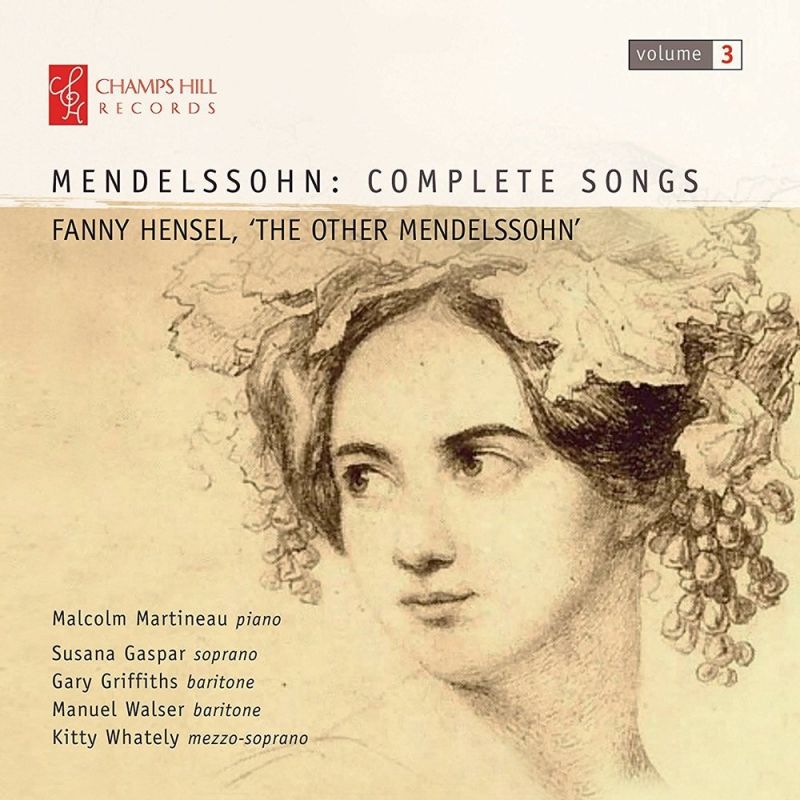F MENDELSSOHN-HENSEL Complete Songs Vol 3
View record and artist detailsRecord and Artist Details
Composer or Director: Fanny Mendelssohn-Hensel
Genre:
Vocal
Label: Champs Hill
Magazine Review Date: 02/2018
Media Format: CD or Download
Media Runtime: 59
Mastering:
DDD
Catalogue Number: CHRCD124

Tracks:
| Composition | Artist Credit |
|---|---|
| (6) Lieder, Movement: Morgenständchen |
Fanny Mendelssohn-Hensel, Composer
Fanny Mendelssohn-Hensel, Composer |
| Ich kann wohl manchmal singen |
Fanny Mendelssohn-Hensel, Composer
Fanny Mendelssohn-Hensel, Composer |
| Im Herbste |
Fanny Mendelssohn-Hensel, Composer
Fanny Mendelssohn-Hensel, Composer |
| (5) Lieder, Movement: Der Vorwurf |
Fanny Mendelssohn-Hensel, Composer
Fanny Mendelssohn-Hensel, Composer |
| Traurige Wege |
Fanny Mendelssohn-Hensel, Composer
Fanny Mendelssohn-Hensel, Composer |
| Der eichwald brauset |
Fanny Mendelssohn-Hensel, Composer
Fanny Mendelssohn-Hensel, Composer |
| Gegenwart |
Fanny Mendelssohn-Hensel, Composer
Fanny Mendelssohn-Hensel, Composer |
| Gleich Merlin, dem eitlen weisen |
Fanny Mendelssohn-Hensel, Composer
Fanny Mendelssohn-Hensel, Composer |
Author: Tim Ashley
Seesawing shifts between major and minor keys probe ambiguities of feeling in ‘Ich kann wohl manchmal singen’ and ‘Warum sind denn die Rosen so blass?’ The latter, hinting at sexual betrayal, has a real sting in its tail. Bach informs both Hensel’s vocal writing and her use of pianistic counterpoint in her setting of Goethe’s ‘Gegenwart’, its loftiness thrown into sharp relief here by its juxtaposition with the Schiller song ‘Der Eichwald brauset’, with its Sturm und Drang turbulence. ‘Im Herbst’ opens with a sequence of truly startling dissonances, while ‘Die frühen Gräber’, a setting of Klopstock at his most despairing, is a remarkable confrontation with mortality, as a high vocal line meanders over immovable, penumbral chords, low in the piano.
Martineau’s programme is carefully crafted to emphasise points of contrast not only between individual songs but also between four very different singers. There are two baritones, and throughout Manuel Walser’s lyrical introversion offsets Gary Griffiths’s darker sound and greater declamatory fire. Walser is at his best in a moodily elegant group of Heine songs near the disc’s midpoint. Griffiths responds to the drama of ‘Im Herbst’ and the nobility of ‘Gegenwart’ with considerable intensity and power. Susana Gaspar’s silvery soprano sounds exquisite in ‘Die Mainacht’ and unearthly in ‘Die frühen Gräber’, and she brings real passion to ‘Der Eichwald brauset’. With only three songs, Kitty Whately has less to do than one would wish, though ‘Warum sind denn die Rosen so blass?’ is a high point, as is her impetuous ‘Nach Süden’ towards the disc’s close. Martineau binds everything together, meanwhile, with playing of great dexterity and eloquence.
Discover the world's largest classical music catalogue with Presto Music.

Gramophone Digital Club
- Digital Edition
- Digital Archive
- Reviews Database
- Full website access
From £8.75 / month
Subscribe
Gramophone Full Club
- Print Edition
- Digital Edition
- Digital Archive
- Reviews Database
- Full website access
From £11.00 / month
Subscribe
If you are a library, university or other organisation that would be interested in an institutional subscription to Gramophone please click here for further information.




